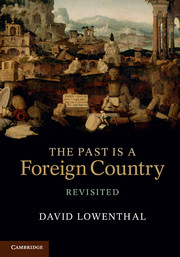Book contents
- Frontmatter
- Table of Contents
- List of illustrations
- List of permissions
- Acknowledgements
- List of abbreviations
- Introduction
- Part I Wanting the past
- 1 Nostalgia: dreams and nightmares
- 2 Time travelling
- 3 Benefits and burdens of the past
- Part II Disputing the past
- Part III Knowing the past
- Part IV Remaking the past
- Select bibliography
- Index
- References
2 - Time travelling
from Part I - Wanting the past
Published online by Cambridge University Press: 05 November 2015
- Frontmatter
- Table of Contents
- List of illustrations
- List of permissions
- Acknowledgements
- List of abbreviations
- Introduction
- Part I Wanting the past
- 1 Nostalgia: dreams and nightmares
- 2 Time travelling
- 3 Benefits and burdens of the past
- Part II Disputing the past
- Part III Knowing the past
- Part IV Remaking the past
- Select bibliography
- Index
- References
Summary
Is it not possible … that things we have felt with great intensity … have an existence independent of our minds; are in fact still in existence? And if so, will it not be possible, in time, that some device will be invented by which we can tap them? … Instead of remembering here a scene and there a sound, I shall fit a plug into the wall; and listen in to the past … Strong emotion must leave its trace; and it is only a question of discovering how we can get ourselves again attached to it, so that we shall be able to live our lives through from the start.
Virginia Woolf, 1938What if you could live your life over again? and again? and again? and again? Most of us would die for a chance to replay.
Ken Grimwood, 1988When he awoke, the dinosaur was still there.
Augusto Monterroso, 1959The pull of the past transcends nostalgic longing for a fanciful or surrogate yesteryear. Revisiting some actual past has long been a fond desire. Many would pay handsomely to relive a year of their personal lives, most to retrieve a day or an hour, especially from youth. ‘O for one hour of youthful joy! / Give me back my twentieth spring! … / One moment let my life-blood stream / From boyhood’s fount of flame!’
The allure of time travel mirrors that of reincarnation. That the past should be irrevocably lost seems unbearable. We crave its recovery. Is there no way to recapture, re-experience, relive it? Some agency, some mechanism, some faith must let us know, see, sense the past. We will feel afresh the daily life of our grandparents, the rural sounds of yesteryear, the deeds of the Founding Fathers, the creations of Michelangelo, the glory that was Greece.
- Type
- Chapter
- Information
- The Past Is a Foreign Country – Revisited , pp. 55 - 79Publisher: Cambridge University PressPrint publication year: 2015



